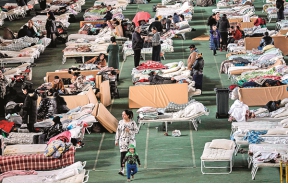TIAN Dewen:EU‘s hospitality awaits test with refugee flows
Tian Dewen,senior research fellow at the Institute of European Studies, Chinese Academy of Social Sciences (CASS).
The article was originally published in CHINA DAILY on March 15, 2022.

Ukrainian refugees take shelter in the main hall of an athletics complex in Moldova's capital Chisinau on Sunday. GIL COHEN-MAGEN/AGENCE FRANCE-PRESSE
Bloc will struggle to manage crisis, with resources stretched, experts say
Although sympathetic countries in the European Union have opened up to a flood of refugees from the conflict in Ukraine, the bloc will nevertheless find it difficult to manage the largest migrant crisis facing Europe in seven decades, analysts said.
By Saturday, some 2.7 million refugees had fled Ukraine since the conflict between Russia and Ukraine started on Feb 24, and that number is still rising, according to the United Nations Refugee Agency. With Ukraine stopping men aged up to 60 from leaving the country, most of those heading abroad are women and children. As there are no flights because of the fighting, they have rushed to neighboring countries, mostly to the west, by car, bus, train, or on foot.
UN refugee agency chief Filippo Grandi said Europe is now confronting its largest refugee crisis since World War II. The UN initially estimated that about 4 million people could flee Ukraine, but said later that the number could be revised upward as the conflict drags on.
Early in the conflict, the Council of the European Union adopted unanimously a decision that enables Ukrainian refugees to receive temporary legal protection for an initial period of one year. They also gain the right of residence, access to the labor market and housing, medical assistance, and access to education for their children. That period may also be extended automatically by six-monthly periods for a maximum of one year.
Over the past few days, there have already been growing concerns about how to protect vulnerable refugees.
Gou Liwu, a researcher on Russian issues at the East China Normal University, said that Ukrainian refugees will certainly exacerbate the refugee crisis in Europe.
Compared with African and Middle Eastern refugees, those from Ukraine find it easier to integrate and be accepted into the EU culturally.
Sudden occurrence
"However, due to the sudden occurrence of the Russia-Ukraine conflict in terms of time and the severity of its impact, which is beyond the expectations of many countries, it will bring great challenges for the EU to accept and resettle these refugees," he said.
Tian Dewen, deputy director of the Institute of European Studies at the Chinese Academy of Social Sciences, said that since the outbreak of the 2015 refugee crisis, countries in Central and Eastern Europe have expressed strong resistance to the EU's program of taking in refugees. This time, they have been much more accepting with Ukrainians. "During the refugee wave from the Middle East, Europe was far away from Syria and was cautious about bringing in terrorists, and Syrian refugees did not want to live in Europe for a long time either," he said.
"The refugees brought by the Russia-Ukraine conflict are not directly related to terrorism and pose little security threat.
"Moreover, these countries are all neighbors of Ukraine, so they will accept Ukrainian refugees whether from moral or political considerations."
However, countries on the EU's eastern flanks are relatively less well off than in other parts of the bloc, meaning their capacities to accept refugees are limited. More financial and material support is expected from other EU countries, the scholar said.
Tian said that refugees have caused problems for the EU in the past few years. Even now, there are still many refugees from the likes of Iraq, Syria, and Afghanistan who are massing on the EU's borders.
He said the influx of refugees into European countries may trouble members of the lower and middle classes of society. Fears over livelihoods and employment are often cited, the scholar said.
If refugees are out of work and part of their welfare assistance has to be paid from taxes, it will also have an impact on society.
"The rise of populism in European countries in recent years is directly related to immigrants," he said.
